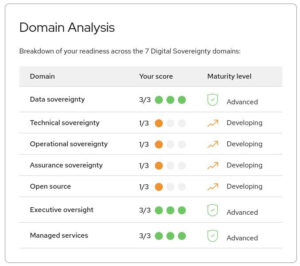Other than PJ, there’s not a character from the SCO saga that I would like to meet face to face.
Not Blake Stowell, even though he knows what went down behind closed doors at SCO and is the most likely candidate to tell what really went on inside the company. In those days he was SCO’s Director of Corporate Communications, the person who had to put a palatable spin on his boss’s actions. These days he’s working as PR Director for Omniture, a data mining company with questionable practices that’s owned by Adobe. Before his tenure at SCO he spent time working for Novell (no surprise) and Microsoft.
I especially have no interest in meeting SCO’s old CEO Darl McBride, the thug who now spends his time being President and CEO of Me, Inc., a renaming of SCO Mobility which he purchased for $100,000 in 2010.
Since leaving SCO, McBride’s life has continued with the sort of gangsteresque intrigue that defined him in the days when he was Linux’s public-enemy-number-one. Last May he made news when The Salt Lake Tribune reported that he had turned over a four year old audio recording of a conversation he had with Mark Shurtleff, who had been Utah’s Attorney General when the recording was made.
The conversation turned around a bad debt McBride was trying to collect.
It seems that McBride invested $286,000 with businessman Mark Robbins, who had promised a $5 million return which McBride had hoped to use to cover legal expenses in the SCO vs. IBM case. Unfortunately for McBride, Robbins skipped town to avoid being served a bench warrant in an unrelated civil case and was nowhere to be found. In an attempt to collect the debt, McBride established a website, Skyline Cowboy, which the Tribune described as “a sort of virtual bounty-hunting operation aimed at flushing out Robbins.”
That led to a breakfast meeting at a Salt Lake City cafe with DA Shurtleff in May of 2009, which resembled a scene from a Coen brothers’ movie.
“‘He [Robbins] is very concerned, because he can’t get any deals done because people go out and see that [website],’ Shurtleff says on the recording, before launching into the pitch: ‘What can I do?’
“McBride says he needs $2 million. Shurtleff replies that he doesn’t think Robbins has that kind of money, but he believes he can get it from one of Robbins’ associates — Marc Sessions Jenson. A year earlier, Shurtleff’s office had charged Jenson with six securities-related felonies, but the businessman was free at the time as a result of a plea deal struck with the attorney general’s office.
“‘I think he’d do it,’ Shurtleff says. ‘I’ve kind of got a weird relationship [with Jenson] because he is still under a plea-in-abeyance program. We put him on a three-year plea-in-abeyance. He’s got to pay the money back. If he does that, the charges will be dropped. He’s got every motivation in the world.”
According to McBride, he never heard from Shurtleff again. He eventually gave a copy of the recording to federal agents, to be used in an ongoing investigation focusing on Shurtleff and his successor, John Swallow.
McBride found himself back in the news in December with the arrest of Timothy William Lawson, Shurtleff’s self proclaimed “fixer.” The arrest came as part of the ongoing investigation of Shurtleff and Swallow. Lawson was charged with racketeering, two counts of tax violations, retaliation against a witness and two counts of obstruction of justice.
McBride enters into this story because of threats against him made by Lawson.
“Lawson allegedly told McBride that he would be sitting in jail for a long time because Shurtleff had ‘things’ on him. He also said that he had guns and ‘Polynesian friends’ who liked to ‘bust people up,’ according to court documents.
I no longer bother to wonder why Darl McBride is so full of hate and spite toward open source. I still find it odd, however, given the fact that SCO had originally been built around the Caldera distro.
But that was then and this is now.
Eleven years have passed since SCO first began accusing IBM and Linux of using code copyrighted by Unix. That’s not long in the overall scheme of things, but practically a lifetime to a young programmer just entering the job market today. It’s an entirely different world now. Copyrights and patents are still a threat to Linux, but not to the extent they once were. Now we have to worry about hooks, back doors and infiltration, and that government actions will result in a complete lack of trust in all things digital.
Already, the NSA’s actions have seeded suspicions against FOSS organizations that were wholly trusted just a year ago. The idea that everything in a distro should come with source code and include no binaries that aren’t included with the source might’ve seemed idealistic and somewhat unpractical just a year ago. It’s merely prudent now.
The NSA has forever changed the Internet. No matter how the current brouhaha plays itself out, the Internet will never again be what it was a year ago. When Microsoft was throwing money at SCO to help Darl McBride in his attempt to bring down IBM and Linux, we had PJ and Groklaw to explain things to us. They’re gone now, one of the first casualties of the current battle with the NSA.
The Snowden revelations would be disturbing enough if they didn’t tie-in and support a whole range of other disruptive activities being undertaken by our governments and corporate overlords. Under the name “war on terror,” they are seeking out dissidents and watching all of us citizens much too closely.
We can’t afford to let this continue. Our governments have gotten trigger happy when it comes to the keeping-the-population-under-control thing and are using disinformation to paralyze us with fear. If we allow this to continue much further we will never see the freedoms we’ve lost again — and we will lose even more.
Big, bad Darl McBride wasn’t nearly the enemy we’re seeing now with the NSA, but we knew about this danger when we invited the Internet into our homes twenty-five years ago. We just didn’t know how quickly it would deteriorate to this sad state of affairs.
Christine Hall has been a journalist since 1971. In 2001, she began writing a weekly consumer computer column and started covering Linux and FOSS in 2002 after making the switch to GNU/Linux. Follow her on Twitter: @BrideOfLinux








What a wonderful title, people at work are wondering why I was laughing.